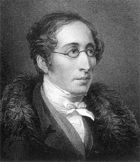Carl Maria von Weber
 From Conservapedia - Reading time: 2 min
From Conservapedia - Reading time: 2 min
Carl Maria von Weber (1786-1826), German composer, is considered to be the first writer of romantic opera, and the founder of a national German style of opera that moved away from the French and Italian styles of the day and would find its greatest expression in the music-dramas of Richard Wagner.
He first studied under Joseph Haydn’s brother, Michael, and elsewhere, and worked in various places in Germany before settling in Prague as opera director. His 1811 opera “Abu Hassan” had met with some success. In Prague, he reorganised the company in practical ways and in its program to reflect his developing German musical nationalism.nationalism. He was appointed kapellmeister at Dresden in 1817 and, three years later, his most popular work “Der Freishütz”, was performed in Berlin to critical and popular acclaim.
“Der Freishütz” was a German tale, sung in German, with German costume and stage settings, with German folk elements in its tunes, and thoroughly romantic in its musical forms and its treatment of the supernatural elements in the story. Its success was international (including in New York in 1825) and led to commissions from Vienna for “Euryanthe” (1823) and London for “Oberon”. Both were successes and remain so today.
In 1826 Weber, already ill with tuberculosis, was invited to London to conduct the premiere of “Oberon” at Covent Garden. He died, still in London, some eight weeks later.
Weber’s fame is not restricted to opera. He figures in the development of the song cycle, and the clarinet as a popular instrument. He was a virtuoso clarinettist as well as a fine pianist. He is considered the first true romantic composer.
Popular Works[edit]
- “Der Freishütz” is in the repertoire of many opera companies. “Euryanthe” and “Oberon” both enjoy modern performances. Their overtures, including “Abu Hassan”, are performed in concert. Other dramatic works include incidental music to stage plays, some of which is currently on record.
- Two Symphonies, two piano concertos, a “concerzertstück” for piano and orchestra, and a bassoon concerto are frequently performed.
- His works for clarinet are among the most important for that instrument – two concertos, a concertino, a clarinet quintet,[1]
variations for clarinet and piano and for clarinet and string quartet, and the great “Grand Duo Concertant” for clarinet and piano [2] are all staples of the repertoire.
- There are numerous recordings that include his songs and choral works, and a piano piece, “Invitation to the Dance”, is very popular, both in its original form and in the orchestral arrangement by Hector Berlioz.
 KSF
KSF